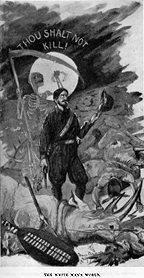Following the Equator
 Following the Equator, published in 1897, was one of Mark Twain's last major works.
Written in his now-familiar format of the travel book (seen by the American public in the 1869 Innocents Abroad and the 1872 Roughing It), Following the Equator details Twain's travels in Fiji, New Zealand, Australia, India, and South Africa.
Following the Equator, published in 1897, was one of Mark Twain's last major works.
Written in his now-familiar format of the travel book (seen by the American public in the 1869 Innocents Abroad and the 1872 Roughing It), Following the Equator details Twain's travels in Fiji, New Zealand, Australia, India, and South Africa.
 Unfortunately, Following the Equator is a largely ignored and forgotten work of Twain's. While it is not his most impressive text in terms of humor, description, or style, a close examination of certain scenes in Following the Equator reveals important things about Twain's view of indigenous race in general, and how those views may have changed throughout his life.
Unfortunately, Following the Equator is a largely ignored and forgotten work of Twain's. While it is not his most impressive text in terms of humor, description, or style, a close examination of certain scenes in Following the Equator reveals important things about Twain's view of indigenous race in general, and how those views may have changed throughout his life.
Twain recounts an anecdote of a tragic encounter between an Australian squatter and black aborigines which becomes a telling metaphor for white contact with indigenous people.
Here is an instance. A squatter, whose station was surrounded by Blacks, whom he suspected to be hostile and from whom he feared an attack, parleyed with them from his house-door. He told them it was Christmas-time-a time at which all men, black or white, feasted; that there were flour, sugar-plums, good things in plenty in the store, and that he would make for them such a pudding as they never dreamed of-a great pudding of which all might eat and be filled. The Blacks listened and were lost. The pudding was made and distributed. Next morning there was howling in the camp, for it had been sweetened with sugar and arsenic!" (211)
Twain's evaluation of the squatter's actions is ambivalent. He says, "The white man's spirit was right, but his method was wrong. His spirit was the spirit which the civilized white has always exhibited toward the savage, but the use of poison was a departure from custom. true, it was merely a technical departure, not a real one; still, it was a departure, and therefore a mistake, in my opinion. It was better, kinder, swifter, and much more humane than a number of the methods which have been sanctified by custom, but that does not justify its employment. That is, it does not wholly justify it" (211).
Twain does not sanction the squatter's cruelty, yet he expresses understanding at the squatter's motive and predicts the inevitable demise of the aborigines. Whether or not the aborigines consume poisoned Christmas pudding, have violent encounters with whites, or suffer from disease they have no resistance to, Twain asserts that their future is the same. In a perverse way, the squatter shows "mercy" because he alleviates the aborigines' suffering in the years to come. Yet, Twain rejects that logic as well with the chapter's final biting sentence, "There are many humorous things in the world; among them the white man's notion that he is less savage than the other savages" (213). This is a different author than the one who created a character full of innate racial "savagery" as Injun Joe in The Adventures of Tom Sawyer, or who claimed in The Noble Red Man that Indians are "ignoble-base and treacherous, and hateful in every way."

 Read Chapter XXII
Read Chapter XXII
Return to Twain's Indians
 Following the Equator, published in 1897, was one of Mark Twain's last major works.
Written in his now-familiar format of the travel book (seen by the American public in the 1869 Innocents Abroad and the 1872 Roughing It), Following the Equator details Twain's travels in Fiji, New Zealand, Australia, India, and South Africa.
Following the Equator, published in 1897, was one of Mark Twain's last major works.
Written in his now-familiar format of the travel book (seen by the American public in the 1869 Innocents Abroad and the 1872 Roughing It), Following the Equator details Twain's travels in Fiji, New Zealand, Australia, India, and South Africa.


 Read
Read